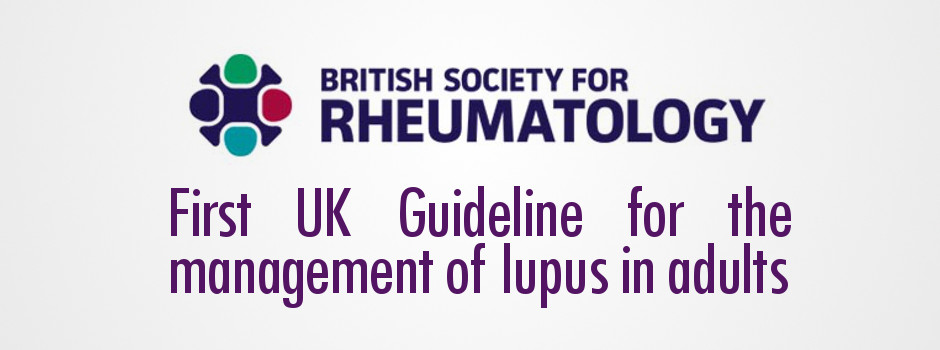
First UK Guidelines for Management of Lupus in Adults Published
 October 06th, 2017
October 06th, 2017 Nakita Cambow
Nakita Cambow Latest News
Latest News 0 Comments
0 Comments
On Friday 6th October 2017, during Lupus Awareness Month, the British Society for Rheumatology (BSR) published the first UK guideline on the care of adults with systemic lupus erythematosus (lupus). The clinical guideline is accredited by the National Institute for Health and Care Excellence (NICE).
Lupus affects nearly 1 in 1,000 people in the UK, a large proportion of whom are female. It can affect any part of the body, presenting differently in each case. It is often difficult to diagnose and treat. Lupus has a major impact on the health and lifestyle of patients and in rare cases can unfortunately result in premature death.
The eagerly awaited guideline covers diagnosis, assessment, monitoring and treatment of patients with mild, moderate and severe lupus. Whilst primarily aimed at rheumatologists and clinical nurse specialists in lupus, nephrologists, immunologists, dermatologists, emergency medicine practitioners, GPs and many trainees will also use the guideline.
The guideline’s recommendations address the care of patients with common symptoms such as skin rashes and arthritis as well as those with less common, but potentially more serious problems like kidney disease. It promotes the referral of patients with the most serious and difficult-to-control disease to specialised lupus centres with experience of new therapies and with multi-disciplinary team backup.
Caroline Gordon, lupus expert, Professor of Rheumatology and lead guideline author comments: “Once my colleagues in the UK implement this guideline, I would expect that patients will experience measurable improvements in care as a result of earlier diagnosis and more appropriate treatment; they can expect more rapid resolution of symptoms, reduction in disease flares and improvements in their quality of life, with fewer long term complications of the disease and its treatment – and, ultimately, improved survival.”
Yvonne Norton, patient representative of the Guideline Working Group said: “Since being diagnosed in 1975, I’ve spent what must amount to years in hospitals and I take a massive amount of medication. I can’t fault the doctors who’ve treated me but it would have been so much better and easier for them, and me, if there had been a guideline to show the right path for them to take.”
Chris Maker, CEO of LUPUS UK said: “The diagnosis and treatment of patients with lupus in the UK has often been inconsistent, with those seeking a diagnosis often facing delays of several years and experiencing uncertainty about their treatment. We hope that the implementation of the Guideline will reduce the current diagnosis times and result in earlier access to appropriate treatment, reducing flares and, ultimately, giving a better quality of life for patients.”
You can read and download the full guideline below:
–
About British Society for Rheumatology:
British Society for Rheumatology exists to promote excellence in the treatment of people with arthritis and musculoskeletal conditions and to support those delivering it. They are the leading UK specialist medical society for rheumatology and musculoskeletal care professionals, representing the whole multi-disciplinary team: consultant rheumatologists, trainees, specialised nurses, physiotherapists, occupational therapists, psychologists and GPs with special interest in rheumatology. The society aims to improve standards of care in rheumatology and secure a high priority for rheumatology services.
The BSR obtained National Institute for Heath and Care Excellence (NICE) accreditation in 2013, which recognises that their guidelines are robust, evidence-based and developed using critically evaluated high quality processes. The society has published a number of guidelines under NICE accreditation which can be viewed at www.rheumatology.org.uk/Guidelines



 ©2024 LUPUS UK (Registered charity no. 1200671)
©2024 LUPUS UK (Registered charity no. 1200671)